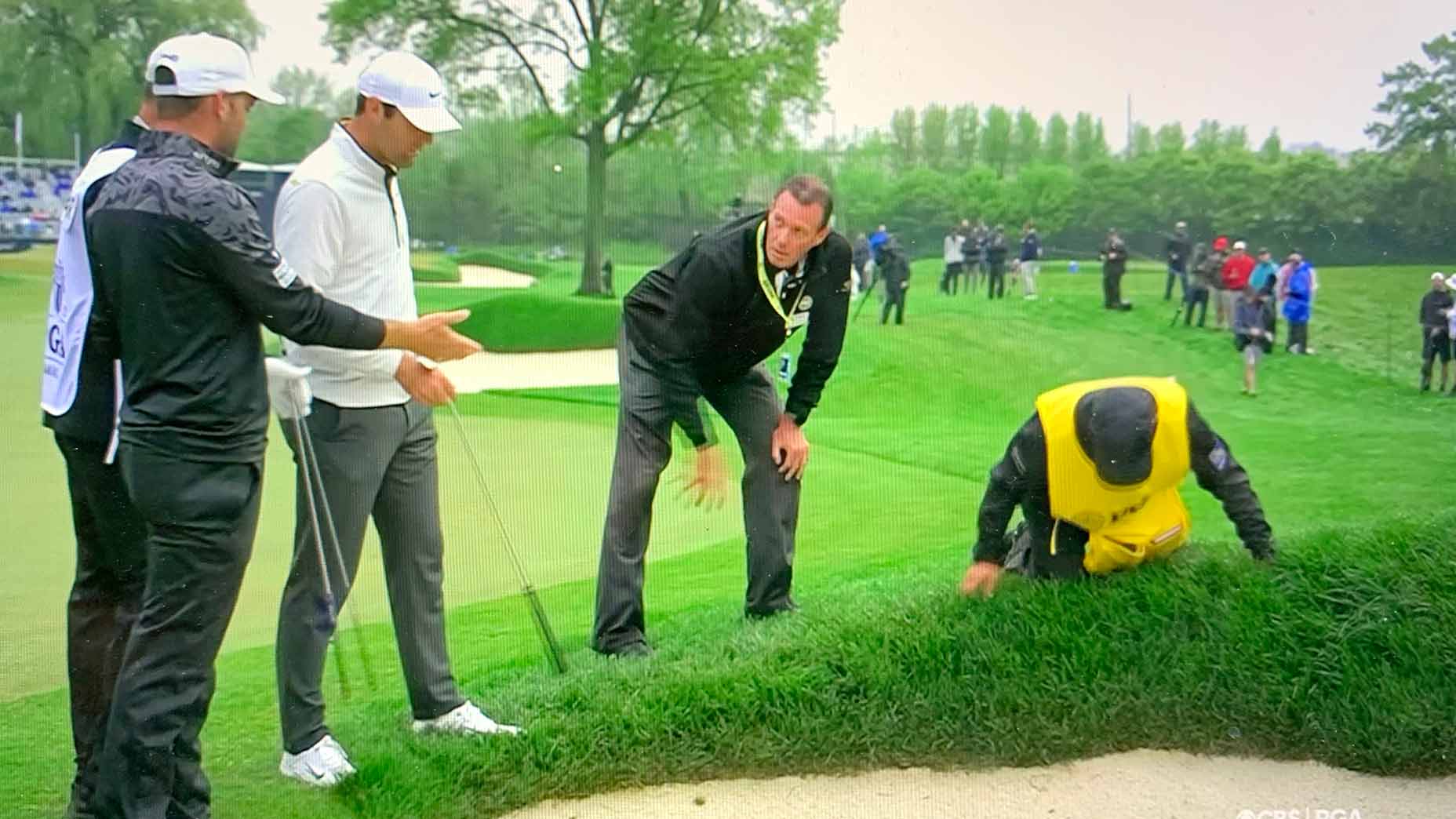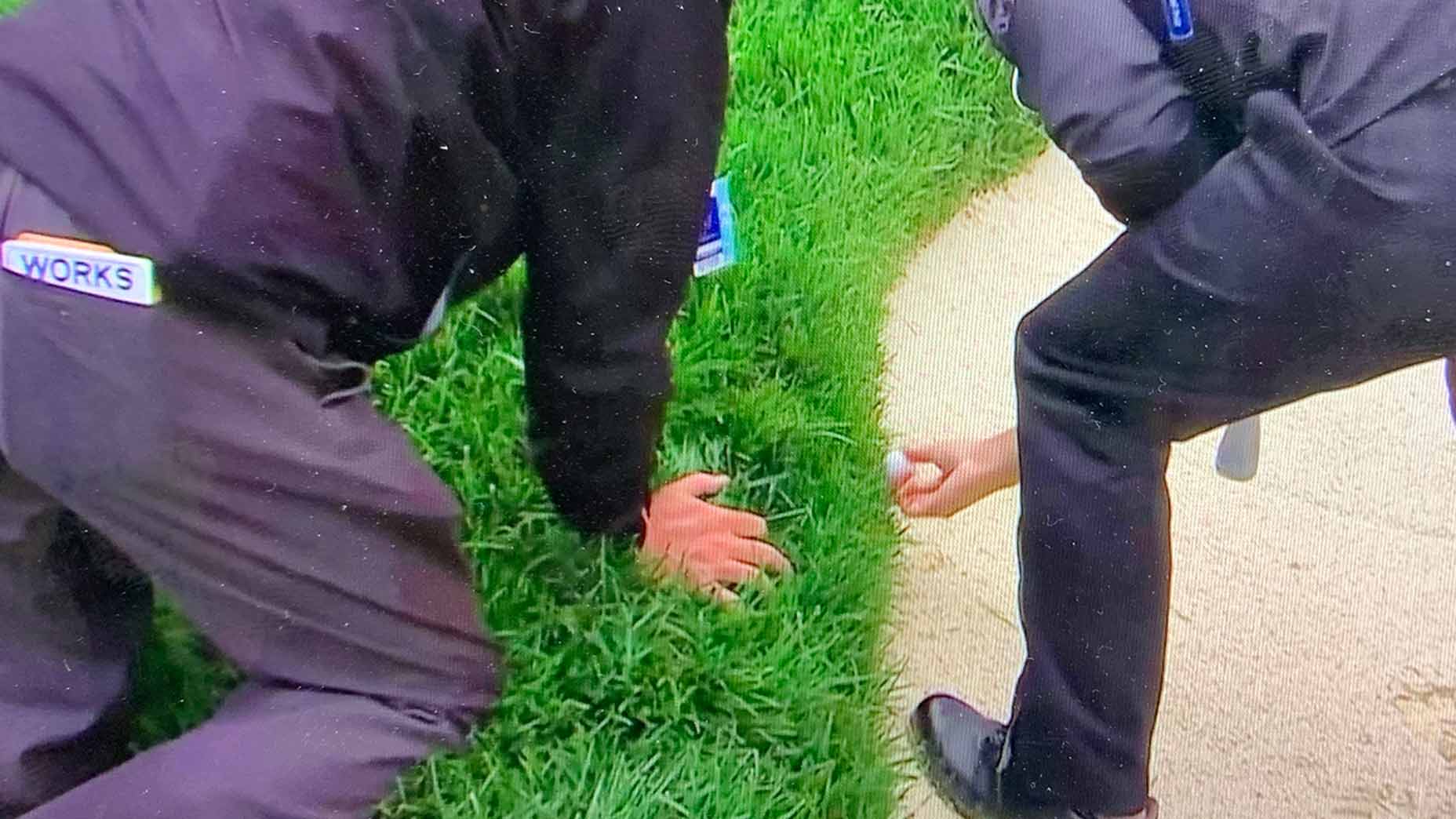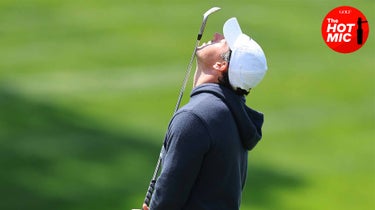
Players, caddies and a rules official talk through Corey Conners’ situation on the 16th hole on Saturday at the PGA Championship.
CBS
Everything was going so well for Corey Conners, at least until he found a fairway bunker late on Saturday. The 31-year-old Canadian had the solo lead at the PGA Championship at Oak Hill Country Club in Rochester, N.Y., and through 15 difficult holes and in equally troublesome conditions, he was still the only player without a bogey on his scorecard in Round 3.
And then came the par-4 16th hole, and he hit his drive into a bunker.
No worries? Well, not exactly. Conners had 158 yards remaining to the hole for his approach, but he lost sight of the ball as soon as he made contact.
Where was it? Eventually, they figured it out — embedded in the lip of the bunker.
“I didn’t make great contact there. I saw everybody looking up in the air. I did that as well,” Conners said afterward. “I thought it maybe skipped up. But you know, didn’t see anything land and was pretty certain it was embedded there.”
This part, however, took some time to sort — and the jury is still out whether he caught a bad break or a good one.
They assumed the ball was either stuck in the bunker lip or in the thick rough just beyond it, but they couldn’t find it. Mike Raby, a PGA of America rules official, came over to address the situation. A few minutes later they found the ball embedded in the lip, or at least a part of it.
Raby added that the reference point for relief would be the nearest spot no closer to the hole outside of the bunker, then within a club length of that.
“So right behind that ball would have been bunker, right,” Raby said to Conners, as they looked at the ball stuck in the turf. “So we need to find the nearest spot no closer that’s outside the bunker, which is probably in here somewhere (gesturing down to the grass), and we’ll just mark that and measure a club length no closer and mark in that club length.”

CBS
As this all played out and as the broadcast listened in, Frank Nobilo called it a “horrendous break.”
“But not a very good shot, either,” Trevor Immelman added.
When dropping, they struggled to find a spot that wasn’t closer to the hole. That took another three to four minutes.
Eventually, Conners found a spot to drop — embedded ball relief was a free drop here — but this rough was no good either, and his shot from 153 yards landed short and right of the green still 29 yards away. He said the ball was below his feet and he didn’t quite adjust how he should have.
“Wish I could have that one back,” he said.
He was in a treacherous spot short-sided with a bunker in front of him, but he did well to pitch it to 11 feet.
“If you were a betting man I don’t think you’d expect that to be that close,” Nobilo said. “Superb. If he could just get away dropping one shot here, I minor little miracle.”
But he didn’t. The putt didn’t break as much as he thought, and he settled for a double-bogey 6.
“That’s a heavy penalty for that tee shot,” Nobilo said.
When Conners stepped to the 16th tee, he was seven under and one ahead of Brooks Koepka and Viktor Hovland. After that hole, he trailed them by one.
How did Conners and his caddie regroup? They laughed about it.
“It was an unfortunate situation and a poor shot,” Conners said. “Didn’t really affect the last few holes. Just tried to give myself a couple looks on 17 and 18.”
He finished par-par to shoot an even-par 70, and he’ll begin Sunday’s final round tied with Hovland at five under. They’re both chasing Koepka, the four-time major champ, who leads by one.
“For Conners, a lot of it is going to be, how quickly can he flush what happened at 16?” Immelman said. “It was pretty much a flawless day other than that hole.”
“And a freakish result with the second shot,” Jim Nantz added. “I was impressed by what I saw.”
Conners was asked afterward if he feels he got a good break or a bad one.
“If it wasn’t embedded, it was a pretty steep bank,” Conners said. “I don’t think it would have stayed on there, but yeah, was able to get a free drop, and yeah, maybe got a break.”










